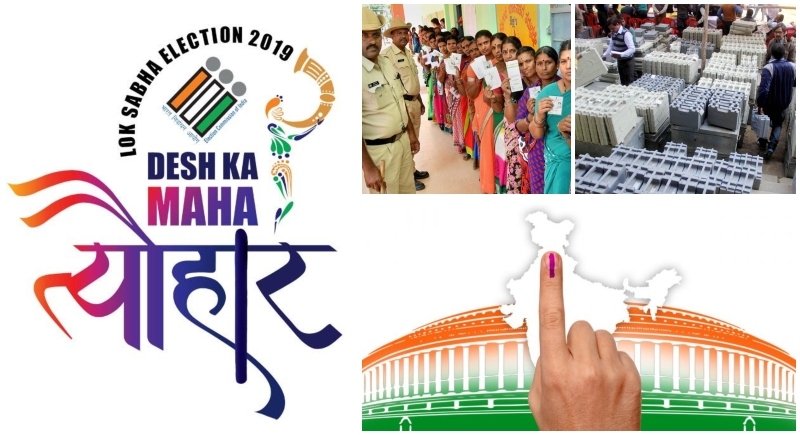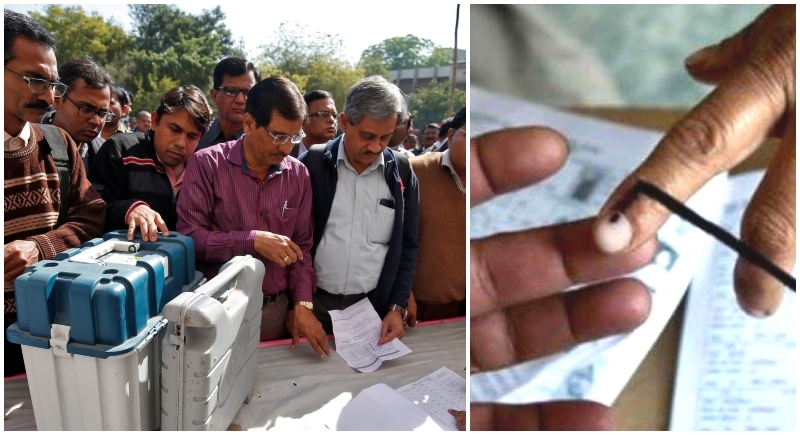Beware of conspiring demons as the fever of upcoming Lok Sabha elections 2019 rises high.!
The fortune-teller and the devil’s dance: The demoniac dreams:
Everybody is on the run as the countdown has begun ahead of time. We are reminded of a yesteryear’s “time pass” game called ‘musical chair’. Every electoral player seems to be quite confident and is sure to be the next ‘ruler’ of the country taking oath of office sometime in the last week of ensuing May!

In a way every election is an important event which determines the future course of action of the country. The said rule is applicable to the present situation too. Yet, the impending general election to the central legislature of the country has assumed an unprecedented significance on account of venomous competition between a few individual politicians who have shamelessly exhibited their personal agenda of enmity and revengeful vows to eliminate their rival competitors in every possible manner. The level of allegations has touched the nadir point crossing all the limits of political and social decency. The opposing political views and programs seem to have led them into barbarian enmity. Personal allegations against high office holders such as the Prime Minister, other senior Union Ministers hurled by very ordinary political leaders working at the lower echelons of the political parties within, cuts a sorry frame of the dialogue and debates at the national background.
An unprecedented opportunity for the national electorate:
The destiny has offered an unprecedented opportunity to the electorate which is in the offing for its voters in the country in the ensuing General Elections to the parliament of 2019. The democratic electoral battle for parliamentary democracy is being fought in a most undemocratic manner and the poor common helpless voter is worried over the future of the country. The electoral behaviour of all political parties has posed serious questions of soundness of the parliamentary democracy in the country. The craze for power and authority is on such a high rise that it has crossed all the known and acceptable limits of self-restraint and decency. The mutual mud-slinging on the part of all political groups has reached an unprecedented level and has formed a shape of monstrous conceit. The allegations against each other by the political leaders have led to criminalisation of democratic dialogue. The voters seem to enjoy the dog-fight but a few of these seem to worry for the future of parliamentary culture which has been a backbone of the civilised society of India. The cyber-clad-army-ammunition has poured fuel to the fire. A permanent boundary line is drawn of blood-thirsty enmity (in certain cases it covers generations).
Origins of economic growth, development and democracy:
The last two and half centuries, the world has witnessed a gradual change in the form of governments, governance and the growth of state apparatus. The gap between the individual and the state has been differently articulated. Absolute monarchies succeeded by constitutional monarchies, birth of republicanism, authoritarian republicanism, parliamentary democracy, theological republican parliamentary democracy, sultanas (in the middle east) single party parliamentary democracy, multi-party parliamentary democracy, presidential form of government, federal structure of government, unitary structure of government- all these models of governance have taken place during the 250 years. It is interesting to note that irrespective of the structure of government, the individual and his economic development, the society and the governance all had the individual at the centre of planning for economic development.
Democracy as a value and democratic practices as the strategy have contributed to the establishment of peace and social stability, constitutionalism along with rapid socio-economic development. Although the term democracy has been defined differently by the thinkers and the practitioners of democracy, all those concerned with democracy agree on one common argument/contention – i.e. economic development the individual and the society. Democratic forms and practices of government are the result of the increased importance and position of the individual in the society.

Democracy has been the journey of plenty from the select few to the entirety. There is more peace, education, liberation of human energy and initiative wherever there is democracy and democratic institutions. Although it is true that the individual has had a subordinate position in the society, democratic institution have elevated his position tilting the balance in his favour unleashing full development forces towards him if we look into the early history of parliamentary democracy, it is to be noted that the early parliaments were congresses fo feudal lords and subsequently the assemblies of rich traders who benefited the king or the state as well as reaped many privileges from the state. The process of this sort still continues today with various lobbies, interest groups, pressure groups functioning to strengthen the democratic process. “A rigid structure of governance, economic activity controlled by feudal lords and thought defined by religion ruled society. Economically land was the basic of wealth. Socially, heredity was the determinant of position and opportunity. Intellectually, theological doctrine was the sole arbiter a truth. In short, economic religious and civil liberties, which are the core of democracy, were suppressed by forces of religious and political absolutism, and did not re-emerge until the 15th century”.
(Source: http://www.icpd.org/democracy/index.htm)
The social situation in India was not any different from the above description. The diversity of India which was characterized by socio-cultural pluralism. The Indian society and several castes not only amongst the dominant religions i.e. the Hindus even Muslims and Christens converts too had its socially origins in the past. Prof. Maria Misra; states. “The Mandal controversy, coupled with embrace of a more open and market-driven economy after years of control and hear autarchy, offered the Hindu right the opportunity to break out of its ghetto of hard-core, culturally conservative, small-town supporters to create, for a while at least, a broader constituency.”
(Source: Vishnu’s Crowded Temple- India since the Great Rebellion- Prof. Maria Misra Pub. Penguin books, UK 2008, p.407)
According to Maria Misra the Indian tax system was inadequate to finance the building of the infrastructure for economic development. The education and educational facilities which were under-funded but was available in India catered by and large to the most privileged. No wonder that India is one of the developing countries which had lowest literacy rates. On the other hand India to a great extent strikingly failed in the field of infrastructural and communication network development at the grass root level. The SEZ programmes have also met with initial resistance from the common masses indicating the lack of political legitimacy.
In the federal structure of India, development efforts are undertaken by both the Union government and the federating unit i.e. the State. Both the tiers are dependent upon each other. The federating units mutually draw inspirations from the experiences and experiments of each other. Gujarat has in recent times become an outstanding and worth emulating role model of development for every other State and esp. the Union.
Need of the restrictive measures :
These elements furthermore need another factor which can be taken into account as an important instrument of mobilising financial support from several corners. It is the formulation of a scheme which would regulate the patterns of political propaganda and the manner of its operation which has become imperative to execute lest it would lead to uncontrolled acrimonious exchanges. The precarious and volatile political situation has warranted certain restrictions on the electoral process. The defenders of freedom and liberty forget that their right to freedom is certainly a foreplay of the freedom and is subjected to the respect for parliamentary democratic practices.
Dr. Sharad Vasudeo Khare





